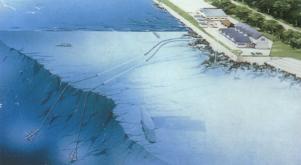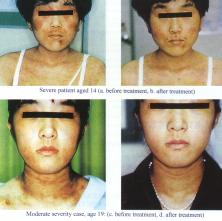Dossier Océan et énergie - Énergie Thermique des Mers
Sommaire IOA News Letters
Treatment of Severe Atopic Dermatitis by Using Deep Seawater
By
Nomura
Ichiro
Department of Pediatrics, Muroto Central Hospital, Kochi,
JAPAN
Seawater can be classified into two groups at a depth of 200 meters; surface seawater and deep seawater. Deep seawater contains more nutrients for plankton such as phosphates and nitrates but it contains plankton or bacteria when compared to the surface seawater. This fact allows us to store deep seawater for up to one month without any special treatment.
Atopic dermatitis is a chronic skin decease characterized by its allergic background of the patients and itchy eczematous skin. So far, several approaches, including antigen elimination, topical corticostreoid ointment, or anti-allergic drug administration, are applied for the treatment of children with severe atopic dermatitis. In some cases, these treatments still do not provide successful results dut to its adverse reactions or of the efficacy itself.
There is a report from National Children's Hospital in Tokyo, that seashore bathing was effective for the treatment of children with severe atopic dermatitis, which suggest us that seawater may contain something effective for the treatment of atopic skin. As seawater is not always available because it is hard to store for a long time, we designed a new protocol for the treatment of severe atopic dermatitis by using deep seawater.
366 patients diagnosed with atopic dermatitis (age 0 to 63 y.o.) were treated for several months with the following protocol;
1. apply deep sea water directory to the eczematous skin for 5 minutes
2. wash and rinse out extensively with usual soap and water
3. use regular ointment
Regular ointment therapy was not changed before and after using deep seawater. Skin condition was assessed using an original symptom-area-severity scoring system before and every 4 weeks after treatment by doctors.
Deep seawater from a depth of 320 meters was pumped up and packed in plastic bottles and was provided from Kochi Artificial Upwelling Laboratory.
Each bottle was delivered every other week and stored in the refrigerator before use.
Results show,61 % of the patients was qualified "Eeffective", which reflect with over 5 points reduction of the symptom score; 36 % for "No change", with 0-4 points reduction, and 3 % for "Worth". No cases showed severe adverse reactions except slight irritation to the skin.
These data suggest that deep seawater might be a useful treatment for children with severe atopic dermatitis. The effect of deep seawater on immune system in vitro and double blind control study in vivo is under investigation.


This study was supported by the grant from Office of Marine Product, Kochi Prefecture.
The Deepsea Water Oceanography Institute at Murotoat a rate of City, Kochi prefecture is to use in the study of the first of its kind in Japan. Ocean water 320 M below is pumped up 900 tons/day culturing of maritime creatures (original pictures supplied by courtesy of Maritime Science Technology Centre).